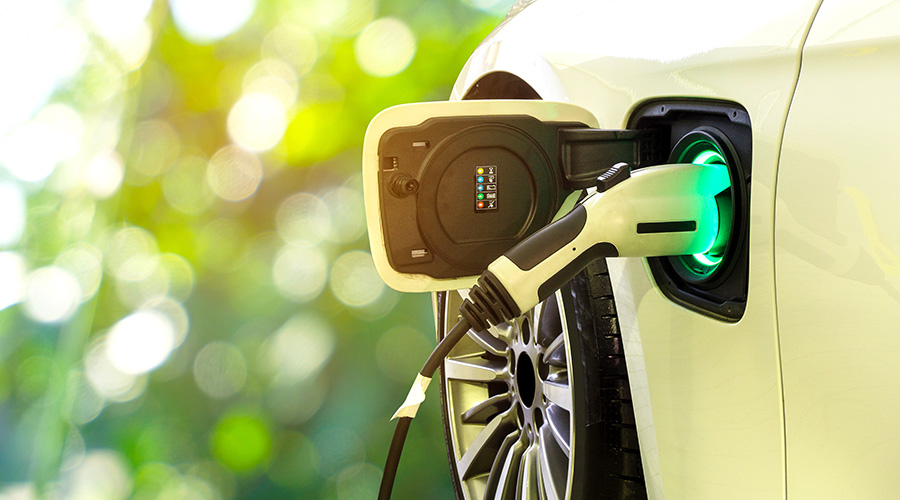
4 Tips for Future-Proofing EV Charging Infrastructure
Facility managers should look to future as demand for charging stations grows April 1, 2024
By Elbert Walters III, Contributing Writer
As electric vehicles (EVs) rapidly gain popularity across the United States, there is an increasing demand for expanded charging infrastructure. According to a report by S&P Global, around 2.13 million Level 2 public charging stations and 172,000 DC fast charging stations are predicted to be necessary by 2030 to support the growth in EV numbers.
With the anticipated rapid increase in EV adoption over the coming decades, it is crucial for facility managers to strategically plan for EV charging infrastructure now. Even when starting small, proactive planning ensures orderly, cost-effective development that can expand efficiently as needed.
Facility managers should consider taking these four steps when planning for the future of EV charging infrastructure to avoid unnecessary expenses due to unexpected advancements:
1. Plan for future EV needs: When planning EV charging infrastructure, it is essential to consider space requirements for current and future needs. Evaluate the available facility space and determine if it can accommodate the desired number of charging stations. Anticipating the future demand for EV charging will allow for allocating sufficient space for expansion now and reduce the need for additional project costs down the road. It is crucial to work with qualified electrical contractors experienced in EV charging installations right from the start of the project. A qualified electrical contractor will perform a site assessment of the existing property and be able to provide expert guidance on the optimal design for electric vehicle supply equipment (EVSE) infrastructure. Using a qualified electrical contractor will ensure infrastructure safely and accurately, meeting all required standards of local building and electrical codes.
2. Invest in scalable solutions: To ensure adequate space for growth, investing in scalable solutions is key. Smart charging systems and advanced energy management solutions offer the ability to expand capacity or adjust power distribution seamlessly. These solutions optimize energy usage, reduce costs, and promote efficiency. With smart charging systems, facility managers can intelligently balance power loads during peak periods, avoiding strains on power grids and efficiently utilizing available space. By integrating scalable solutions, businesses can accommodate increased demand without the need for costly infrastructure modifications. An experienced electrical contractor will provide helpful insight on scalable solutions best suited for the facility and its energy needs.
3. Pre-install conduit for easy growth: When it comes to EV infrastructure, explore the benefits of installing conduit during the initial construction phase with your contractor. It is a strategic move that offers numerous benefits down the road. It optimizes the ease of future expansion, simplifying and cost-effectively enhancing charging capabilities or adding stations without the need for disruptive and expensive digging or trenching activities later on. This forward-thinking approach not only promotes convenience but is also crucial for ensuring the safety and compliance of the entire EV charging ecosystem.
By following proper conduit installation guidelines, the inherent safety of charging stations, vehicles, and users is greatly increased. Moreover, this aligns with important electrical codes and standards that facility managers are obliged to uphold. This approach not only highlights operational effectiveness but also reinforces the commitment to safety regulations, guaranteeing a resilient and compliant infrastructure to meet both current and future demands.
Before installing EVSE, it’s also important to review the terms outlined in your charging equipment manufacturer's warranty. Many manufacturers cite improper installation as a reason for potentially voiding the warranty. EV charging stations require a high-voltage connection, which, if not installed properly, can pose a risk of electrocution, electrical fires, and damage to your equipment, vehicles and property. This emphasizes the need for a qualified electrical contractor. Choosing a licensed electrical contractor that employs qualified electricians, ensures they have expert knowledge of electrical codes and extensive training needed to safely install electrical infrastructure. Choosing a qualified partner will satisfy your EV charging equipment warranty requirements and protect your investment.
4. Choosing a qualified electrical contractor: Licensed, qualified electrical contractors play a vital role in establishing durable and dependable EV infrastructure. Their commitment to high standards of safety and workmanship will ensure a higher return on your EVSE investment. Furthermore, they possess a deep understanding of best practices, local regulations, and electrical construction codes and standards specific to EV charging installations. Licensed qualified electrical contractors will get the installation done right the first time, preventing costly construction delays or repairs down the road.
To find contractors in the Chicagoland region, visit Powering Chicago's Find a Contractor tool, or to locate contractors outside of the Chicago area, visit the National Electrical Contractors Association (NECA) search tool.
Future-proofing EV charging infrastructure is essential as the demand for expanded charging infrastructure continues to rise with the increasing popularity of electric vehicles. Facility managers should prioritize adaptive and scalable systems like smart charging to optimize energy usage and reduce costs while also considering long-term capacity needs. Incorporating conduit installation during initial construction allows for easier future expansion and ensures safety and compliance. Partnering with reliable contractors who adhere to high standards is crucial for establishing dependable infrastructure. Powering Chicago is your trusted resource for expert guidance and support in embracing a sustainable future in the evolving electric vehicle landscape.
Elbert Walters III is the executive director of Powering Chicago.
Next
Read next on FacilitiesNet












